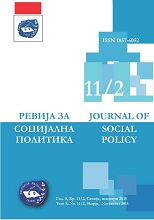Social Work and its Discontents Under Neoliberal Conditions: The Rhetorics and Realities of the Concept „Inclusion“
Social Work and its Discontents Under Neoliberal Conditions: The Rhetorics and Realities of the Concept „Inclusion“
Author(s): Ruth SeifertSubject(s): Civil Society, Governance, Welfare systems, Social development, Social differentiation
Published by: Филозофскиот факултет во Скопје
Keywords: social work; inclusion; European social policy; social exclusion; social inclusion; social differentiation;
Summary/Abstract: A spectre is haunting European social policies and European social work – the spectre of „inclusion“. During recent years, the terms „exclusion“ and „inclusion“ have become central concepts in politics, the social sciences and last not least social work. Social exclusion has been declared to be one of the core problems of social work (cf. e.g. Sheppard 207, 5ff.). Despite a formidable career which the concept has made in politics and academia, turning up in each and every context and corner of the social work discourse, from the very beginning its lack of clarity and analytical lucidity has been critizised (cf. e.g. Anhorn 2008). Thus, the term exclusion – and the demand for inclusion - is used for completely different empirical phenomena such as long-term unemployment, migrants, homosexuals, lesbians, transsexuals, ethnic groups and people with impairments or disabilities – groups and individuals that presumably are not exposed to the same mechanisms of exclusion and whose „exclusion“ takes very different forms.
Journal: Ревија за социјална политика
- Issue Year: 2015
- Issue No: 11/2
- Page Range: 13-31
- Page Count: 19
- Language: English

